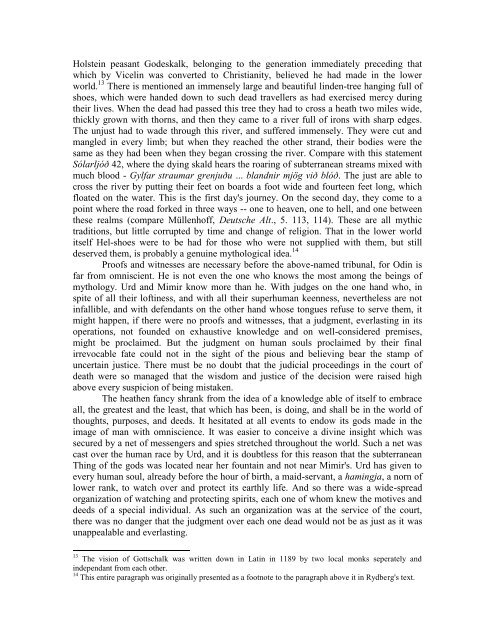Chapters 44-95 - Germanic Mythology
Chapters 44-95 - Germanic Mythology
Chapters 44-95 - Germanic Mythology
You also want an ePaper? Increase the reach of your titles
YUMPU automatically turns print PDFs into web optimized ePapers that Google loves.
Holstein peasant Godeskalk, belonging to the generation immediately preceding that<br />
which by Vicelin was converted to Christianity, believed he had made in the lower<br />
world. 13 There is mentioned an immensely large and beautiful linden-tree hanging full of<br />
shoes, which were handed down to such dead travellers as had exercised mercy during<br />
their lives. When the dead had passed this tree they had to cross a heath two miles wide,<br />
thickly grown with thorns, and then they came to a river full of irons with sharp edges.<br />
The unjust had to wade through this river, and suffered immensely. They were cut and<br />
mangled in every limb; but when they reached the other strand, their bodies were the<br />
same as they had been when they began crossing the river. Compare with this statement<br />
Sólarljóð 42, where the dying skald hears the roaring of subterranean streams mixed with<br />
much blood - Gylfar straumar grenjuðu ... blandnir mjög við blóð. The just are able to<br />
cross the river by putting their feet on boards a foot wide and fourteen feet long, which<br />
floated on the water. This is the first day's journey. On the second day, they come to a<br />
point where the road forked in three ways -- one to heaven, one to hell, and one between<br />
these realms (compare Müllenhoff, Deutsche Alt., 5. 113, 114). These are all mythic<br />
traditions, but little corrupted by time and change of religion. That in the lower world<br />
itself Hel-shoes were to be had for those who were not supplied with them, but still<br />
deserved them, is probably a genuine mythological idea. 14<br />
Proofs and witnesses are necessary before the above-named tribunal, for Odin is<br />
far from omniscient. He is not even the one who knows the most among the beings of<br />
mythology. Urd and Mimir know more than he. With judges on the one hand who, in<br />
spite of all their loftiness, and with all their superhuman keenness, nevertheless are not<br />
infallible, and with defendants on the other hand whose tongues refuse to serve them, it<br />
might happen, if there were no proofs and witnesses, that a judgment, everlasting in its<br />
operations, not founded on exhaustive knowledge and on well-considered premises,<br />
might be proclaimed. But the judgment on human souls proclaimed by their final<br />
irrevocable fate could not in the sight of the pious and believing bear the stamp of<br />
uncertain justice. There must be no doubt that the judicial proceedings in the court of<br />
death were so managed that the wisdom and justice of the decision were raised high<br />
above every suspicion of being mistaken.<br />
The heathen fancy shrank from the idea of a knowledge able of itself to embrace<br />
all, the greatest and the least, that which has been, is doing, and shall be in the world of<br />
thoughts, purposes, and deeds. It hesitated at all events to endow its gods made in the<br />
image of man with omniscience. It was easier to conceive a divine insight which was<br />
secured by a net of messengers and spies stretched throughout the world. Such a net was<br />
cast over the human race by Urd, and it is doubtless for this reason that the subterranean<br />
Thing of the gods was located near her fountain and not near Mimir's. Urd has given to<br />
every human soul, already before the hour of birth, a maid-servant, a hamingja, a norn of<br />
lower rank, to watch over and protect its earthly life. And so there was a wide-spread<br />
organization of watching and protecting spirits, each one of whom knew the motives and<br />
deeds of a special individual. As such an organization was at the service of the court,<br />
there was no danger that the judgment over each one dead would not be as just as it was<br />
unappealable and everlasting.<br />
13 The vision of Gottschalk was written down in Latin in 1189 by two local monks seperately and<br />
independant from each other.<br />
14 This entire paragraph was originally presented as a footnote to the paragraph above it in Rydberg's text.
















